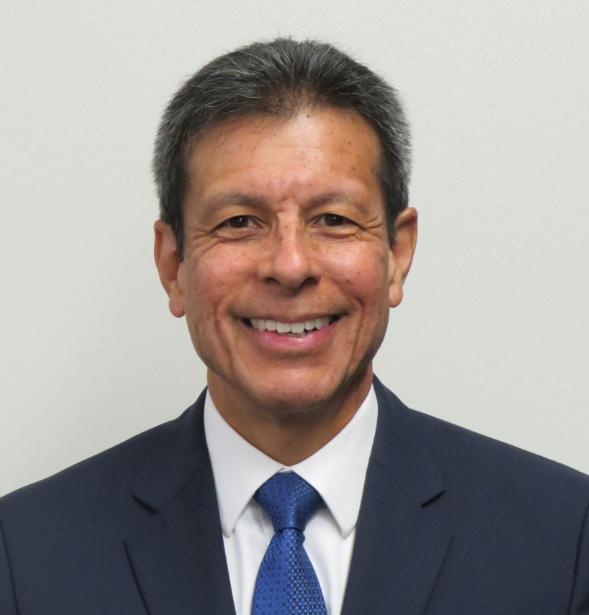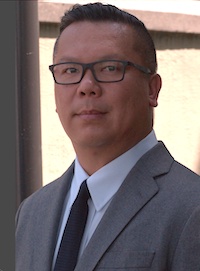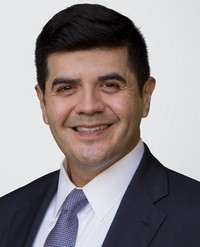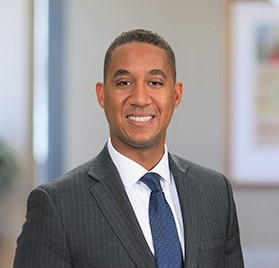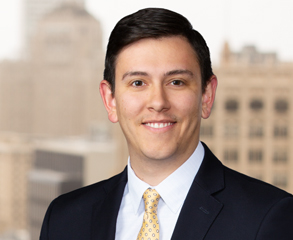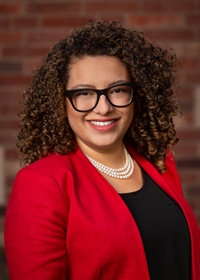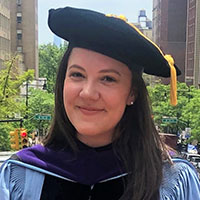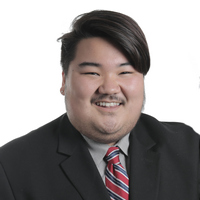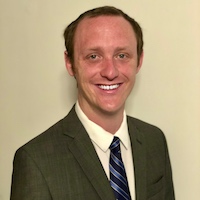Oxy has a strong network of alumni in the legal community. Read below to learn more about how Oxy was foundational to their legal careers.
Judge Dennis J. Landin ’77
UCLA Law School ’80
Contact: dlandin@lacourt.org
How has Occidental helped you through your law journey?
Two things stand out:
- By having a wide variety of classes lead by passionate professors who made themselves available and cared about my future.
- Admitting a very diverse student body that exposed me to people with very different views and experiences.
What advice would you give to pre-law students?
Take classes outside of your comfort zone. Get a job or externship where you have contact with people, preferably those who are in distress and need counseling. Take a vacation before you start law school.
Anh Truong ’95
UC Berkeley School of Law, ’00
Supervising Attorney, Sex & Labor Trafficking, Safe Neighborhoods and Gang Division
Los Angeles City Attorney's Office
How has Occidental helped you through your law journey?
Oxy's rigorous academic instruction laid the foundation for my journey, even before I ever contemplated entering the law. The professors at Oxy were not only remarkable teachers, they were also supportive advisers. I was able to follow my intellectual curiosity and explore the questions of how people act (psychology), how ought they to act (philosophy and ethics), and how we as a society further such goals (public policy)? Oxy's special environment encouraged and supported vigorous debates, challenged my assumptions, and allowed learning beyond the four corners of the classroom. You will find that while memorization and the ability to recite key facts will take you a long ways to becoming a lawyer, what will make you a great lawyer is the critical thinking that comes embedded in an Oxy education: to take the big picture, break it down into constituent parts, challenge assumptions about each component, and put it back together again, perhaps in a new and innovative way. Better yet, you can reimagine an entirely different system. Additionally, it's not only the ability to think, but also the ability to articulate your thinking in writing, and ultimately to do so persuasively, that will make you effective, even if you end up not practicing law. I am grateful that Oxy provided such an excellent training ground for these thinking and writing skills.
Another component that Oxy provided was the opportunity to engage in internships and projects out in the community, which provides a different dimension to the exploration of how the law is applied, rather than the intellectual exercise of reading about laws.
What advice would you give to pre-law students?
I would encourage folks to give thought to the application of the law. Try to get internships or clerkships with those in the legal system so you can see the law in practice. For instance, many are interested in First Amendment law. The problem is that this is a rare area of the law to actually practice and build a career upon. So this exercise gets you to start surveying the landscape as to how you will enter the field of law once you finish law school. If you're interested in the criminal justice system, then find opportunities to see the different players at work. If you're interested in politics and legislation, then find folks who do that work.
When I was back at Oxy (not having any idea I would later go to law school), I did volunteer for the Lead Poisoning Organizing Project while majoring in Public Policy. In hindsight, that experience was immensely useful to see not only the laws that were in place, but also importantly, the hard work of the advocates needed to ensure compliance with those laws. And sometimes, these internships are useful for showing you what you do not enjoy as much as it shows you what you do enjoy. (Along the lines of the former, I highly discourage folks from doing paralegal work as a way to survey the legal system.)
Be mindful also that there are many careers where you are not practicing law but nonetheless, such knowledge and familiarity with legal thinking has tremendous value. Otherwise, I would welcome anyone who is interested to get in touch with me for further discussion.
Eddie Jauregui ’98
Columbia Law School
How has Occidental helped you through your law journey?
Oxy teaches its students to be deep, critical thinkers and strong writers. It also challenges them to navigate new and different experiences. That is a perfect pre-law education. Trial lawyers, especially, have to be able to communicate clearly and effectively and connect with people of all backgrounds on multiple levels – intellectual, emotional, and human. That, to me, is what Occidental was all about. I really can’t underestimate how well Occidental prepared me to succeed in law school and in the practice of law.
What advice would you give to pre-law students?
Become a life-long learner. Lawyering is hard. It takes a long time to become both competent and confident and even then you’re constantly learning new things – be it a new area of law, business, or something else. It’s easy to feel overwhelmed unless you embrace the journey and develop a love of learning. Also, keep going. Do not give up. If you show up day after day and keep giving your best effort, it will pay off and suddenly you’ll realize that you are both good at your job and you enjoy it.
Emily Niklaus Davis ’11
Emory University School of Law ’15
Contact: emily@rossandpines.com
How has Occidental helped you through your law journey?
After I graduated from Oxy I worked as a research assistant for Professor Thalia Gonzalez. That position provided me the opportunity to interview many amazing lawyers in the LA area. It opened my eyes to the different practice areas that exist in the legal field and helped me narrow my interests prior to even being accepted to law school. Also, being a Politics/Spanish double major at Oxy helped me tremendously in my career as an immigration lawyer as I was able to strengthen my Spanish-speaking abilities which made me a lot more marketable when I was searching for a job after law school.
What advice would you give to pre-law students?
Reach out to practitioners to see if you can meet for coffee or speak over the phone to ask them questions about their career paths. Make connections early on and you will be way ahead of the game when you start law school. You never know when one of those connections could turn into a job opportunity down the road.
Carter Norfleet ’11
American University Washington College of Law ’16
Contact: cnorfleet@bakerlaw.com
How has Occidental helped you through your law journey?
My professors and mentors at Oxy prepared me for the challenges of law school and a legal career.
What advice would you give to pre-law students?
Applying earlier in the application cycle will significantly improve your chances of admission to top law schools.
Robert Sandoval ’13
University of Chicago Law School ’16
Contact: robert.sandoval@outlook.com
How has Occidental helped you through your law journey?
My professors at Oxy believed in my potential and prepared me for the challenges of law school and a legal career. To name a few, the late Professor Roger Boesche was a constant resource to me as I decided to pursue my interests in politics and law. During my sophomore year Professor Peter Dreier encouraged me to do Campaign Semester in Chicago--by chance the city of my future law school--and he was an invaluable mentor who challenged me to step out of my comfort zone in preparation for life after Oxy.
What advice would you give to pre-law students?
Applying early in the application cycle will significantly improve your chances of admission to top law schools. I would talk to your pre-law advisors to set an ideal deadline to apply to schools while considering the time you will need to study and do well on the LSAT, write any personal statements, and continue doing well at Oxy.
Estrella Lucero ’14
Yale Law School ’22
Contact: estrella.lucero@yale.edu
How has Occidental helped you through your law journey?
Occidental’s strong focus on reading, writing, and critical thinking provides such a strong foundation for anyone interested in pursuing law. I spent so much of my time at Occidental reading a high volume of material—often dense material at that—and writing essays grounded in critical thinking. These skills are invaluable to law students! Occidental also has a strong pre-law mentoring program and an extensive alumni network that was always helpful and responsive when I was navigating the law school application process.
But my time at Occidental has helped shape my law journey in more ways than just building skills and developing relationships. My time at Occidental fundamentally shaped the type of future I want to work towards and the values that I carried with me to and through law school. I was exposed to social justice organizing and political campaign work that shaped my own “theory of change” for the communities to which I belong. I was able to ground my decision to attend law school in many of the values that I developed at Occidental.
What advice would you give to pre-law students?
Think about the WHAT and the HOW you want to make change—and always remember that law is just one of many ways to make change. When identifying your “what” ask yourself what issue areas do you want to work on? What causes are you curious or passionate about? (For example, climate change, racial justice, civil rights, labor organizing, economic development, etc.). But don’t stop there! Ask yourself “how” you want to engage and deploy your skills, knowledge, and privilege. (For example, do you want to work on law suits? Do you want to represent people individually? Do you want to work on policy advocacy? Do you want to organize people directly? Do you want to teach? Do you want to shape media narratives? And so on.) I have often relied on these framing questions in narrowing down what I actually want to do versus what other people at law school expect you to do.
I would also highly recommend that anyone interested in pursuing a law degree take some time off and work for at least a couple of years. The years outside of academia can be monumentally informative. You’ll have a stronger sense of your WHAT and HOW, and you’ll also be able to bring a richer perspective to the discussions you’ll have in the classroom.
Claire Marsden ’14
Columbia Law School ’19
Contact: clairetmarsden@gmail.com
How has Occidental helped you through your law journey?
Oxy teaches its students how to be great writers and thinkers, and those skills have been hugely helpful both in law school and in my career so far. Additionally, the Oxy community’s emphasis on social justice helped shape my perspective on what it means to be a lawyer and how to use the privilege that attorneys have in a strategic, mindful, and empathetic way. Attorneys are often uniquely positioned to advocate for societal change, which is why I wanted to become one, but that position requires interrogation of the attorney’s role when advocating for marginalized groups. Oxy equipped me with the ability to think about these concepts. I also have to shout out the former pre-law advisor, Valerie Savior, who spent an hour on the phone with me discussing my personal statement while I was in a grocery store in DC - she was a huge reason for my success, and I’m sure the current administrators care just as much about helping Oxy students succeed.
What advice would you give to pre-law students?
I have two pieces of advice for pre-law students, and they may seem conflicting. First, there is no requirement that you take only law-related classes while in college for you to be a competitive law school applicant. If you want to do so, like I did, then that’s great - but the critical thinking skills you get from a sociology class or the writing skills you grow in an English class are just as valuable. Critical thinking is really the most important skill in law school, and Oxy’s multidisciplinary education prepares you for that. I have law school friends who studied physics and economics and English in college, so don’t feel limited! Second, make sure that law school is really what you want to do. It’s a huge investment of time, money, and sweat, and it’s not something to take on as a backup plan. I’d recommend doing an internship in which you work with lawyers, or volunteer for a legal clinic, or even spend a lot of time reading Scotusblog. I knew I wanted to go to law school when I got to Oxy, but I still thought through the decision carefully.
Kerry Sakimoto ’15
UCLA School of Law ’21
Contact: sakimoto2021@lawnet.ucla.edu’
How has Occidental helped you through your law journey?
Oxy offers a wide range of classes and learning opportunities taught by some of the most supportive faculty I have encountered, providing the perfect opportunity to begin exploring whether law school is right for you. Additionally, Oxy prepares its students to be critical thinkers who are able to create arguments and answers to complex issues, and to find their voice in a classroom, all of which are invaluable skills to have in law school and legal practice.
What advice would you give to pre-law students?
When I was exploring whether law school was right for me, nearly every person I spoke with told me different things – for some, it was the best decision they made, for others, there was no hesitation in them telling me law school was a waste of time and money. Ultimately, the decision is very personal to you. Law school and legal practice is an incredibly difficult, often expensive experience. However, it has also been one of the most rewarding experiences, where I have felt like I have truly grown in ways that I have wanted to for so long. My advice is to find mentors who have done this before. Find several – ones who have practiced for along time, more recent grads, lawyers in different fields. Don’t be afraid to send cold emails. Every attorney I have reached out to has been incredibly generous with their time, and several have become professional mentors. If it makes sense for your timeline, find ways to gain experience working with attorneys to give you a better sense of what the work will look like during practice. There is no need to rush into law school after undergrad. Most law students, myself included, worked several years before going back to school. It helped me to get a sense for what life was like out of school, to figure out my priorities, and give time and attention to my law school applications. Knowing the importance of why you decided to attend law school really helps get you through late-night studying.
Brian Erickson ’16
Stanford Law Law School
Contact: brianerickson93@gmail.
How has Occidental helped you through your law journey?
Cultivating critical thinking skills in small classes at Oxy, with professors who gave me lots of individualized feedback, helped make the rigors of law school less intimidating.
What advice would you give to pre-law students?
I found it helpful to take a few years off between undergrad and law school to gain work experience. Not only does work experience make you a more competitive applicant (both for law school admission and post-law school employment), but it also helps clarify what you want out of your career. I’m not saying you need to know what type of law you want to practice before starting law school (you don’t!), but knowing where you want to live, what interests you, and what work environments you enjoy will help when it’s time to make post-grad decisions.
Sophie von Bergen ’16
Lewis & Clark Law
Contact: svonbergen@stollberne.com
How has Occidental helped you through your law journey?
The courses at Occidental developed my research, writing, and critical thinking skills. Specifically, the Rebellious Lawyering practicum offered the framework to think about lawyering and practical skills that have served me today.
Occidental’s outstanding faculty also offered opportunities that made an indelible mark on my journey. Working as Professor Jennifer Piscopo’s research assistant gave me research and writing skills that prepared me for law school and beyond. Even after graduation, Occidental’s faculty supported me whether it was discussing where to apply for school or writing letters of recommendation on my behalf.
What advice would you give to pre-law students?
Challenge yourself to learn new things and take courses and opportunities that do not seem directly related to the law (although I recommend taking those, too). When considering which law school to attend, think about what type of environment will serve you best, for example, class size and geographic area. Talk to current lawyers and law students about their experiences. It is, as others will tell you, very much a personal decision. Try not to compare your journey with other people’s journeys. Overall, the connections that you make before and during law school will serve you well in your legal career.
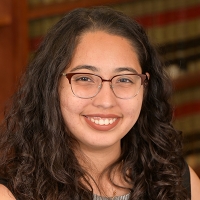
Aracely Ruvalcaba ’20
UCLA School of Law ’25
Contact: Ruvalcaba2025@lawnet.ucla.edu
How has Occidental helped you through your law journey?
Oxy prepares its students to cultivate critical thinking and analytical skills through our rigorous coursework, encouragement to participate in research projects, and engagement in complex debates and discussions. Even after graduating from Occidental, I know I have a support network with the faculty and students in exploring career options, finding internships and job opportunities, and the assurance of being part of a comprehensive support network that aims to ensure the success, well-being, and personal growth of Oxy students both during undergrad and post-college years.
What advice would you give to pre-law students?
Remember that everyone’s journey is unique, so do not compare your journey with other people’s. Comparing yourself to others can lead to unnecessary stress and unrealistic expectations, so there is no urgency to rush into law school after undergrad.
When considering whether to attend law school or pursue legal practice, I recommend you take stock of your motivation to attend law school and how law school can assist in your future goals since the common misconception is that a law degree only leads to practicing law in a traditional sense when, in fact, a law degree opens doors to a variety of career paths as the skills gained in law school are transferable to diverse fields such as business, policy, consulting, academic, and much more.
If you still are unsure whether you want to start law school, I encourage folks to reach out to recent grads, lawyers in different fields, or individuals with whom you are interested to learn more about their career paths. Since the reality is “you don’t know what you don’t know” of the spectrum of possibilities/opportunities a legal degree provides.
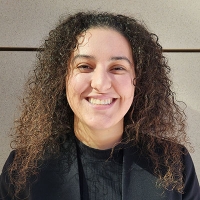
Kaleinani Nallira ’21
UC Berkeley School of Law ’24
Contact: kaleinani_nallira@berkeley.edu
How has Occidental helped you along your law journey?
Oxy helped me through my law journey by giving me the tools and confidence to even pursue law school. The classes, professors, and work at Oxy are aimed to train you to be a more analytical, critical thinker. By preparing to think this way in undergrad, I was better prepared to start law school with an already established analytical mindset.
Although you can major in anything and go to law school, the Critical Theory and Social Justice (CTSJ) department truly helped me find my path towards the law. I took multiple law-related classes that gave me an early insight into the law I want to pursue. I recommend taking classes that will expose you to the law. Majoring in CTSJ helped me reaffirm my goals for becoming a lawyer. Classes that helped me in my journey included Resistance Movements and the Law, Triumphs and Tribulations of Title IX, and Inequity and the Law. Professors in the CTSJ department were integral in mentoring, encouraging, and supporting my journey to law school. Being the first in my family to go to law school, I had not met many lawyers. Having the opportunity to be taught by a lawyer like Professor León inspired me. I loved hearing about her experiences and learning more about the life of lawyer from her. Having Professor León as a pre-law advisor is so valuable and truly a great way to prepare for law school applications and law school itself.
What advice would you give to pre-law students?
My biggest piece of advice to pre-law students is to be open-minded. The practice of law is much broader than I ever imagined. It is not just what you see on TV, there are so many areas of the law to pursue. You may have an idea of the legal work you want to do, but being open-minded may help you discover a practice area you love, that you never knew existed. I would also suggest being open-minded geographically. I went into law school knowing that I wanted to take the bar in California and California only. Fast forward 2 years later and I have found myself applying to take the New York bar. You never know where law school may lead you!
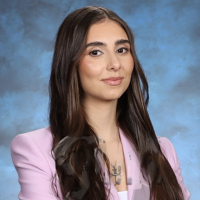
Serena Karina Pelenghian ’21
Chapman University School of Law ’24
Contact: spelenghian@chapman.edu
How has Occidental helped you through your law school journey?
I was not someone who wanted to go to law school from the time they could speak. Law school was actually never a part of my plan. I wrote for The Occidental from my first year at Occidental, and one day, wrote my first opinion piece on the denial of the Armenian Genocide. Suddenly, everyone on campus was approaching me and asking more about the piece, and people from all over the world were emailing me about my piece. I created a conversation, and I began doing that with more of my pieces to follow. I liked the effect that expressing my opinions had on people, so the idea of law struck me on a late night. The next day, I walked into Professor Christianakis’s office and asked her what she thought of the wild idea of going to law school. Immediately and so confidently, she told me that I should do it.
From that conversation, I was inspired. Then, I took Professor León’s “Resistance Movements and the Law” course, where I had this incredible introduction to the legal system and learned more about what law school was. I knew nothing about law school until this course. I met with Professor León a countless number of times while applying to law school. Then, when I was accepted to several schools, we continued to talk about the pros and cons of each of them. Professor León was patient with me, listened to all of my concerns, reached out to anyone and everyone she could to give me more perspectives, and most importantly, was genuinely excited and proud of my accomplishments. Even though I graduated and am now in law school, I still meet with Professor León regularly to ask her for advice and update her on where my career is; I look to her for guidance. She has connected me with different people, given me her honest feedback, and has shared all of her experiences in her career with me.
What advice would you give to pre-law students?
Remember that it is possible, and remember the why. In January 2020, I started studying for the LSAT. Then, COVID began, we had to leave Occidental, classes were suddenly online, I was writing my Senior Comprehensive Project, and a number of other unimaginable events were taking place in my life, all while I was still trying to study for the LSAT. I took the LSAT and did not get a score I felt comfortable with, so I just figured that this was not for me. However, with a lot of motivation from my friends, family, and professors at Occidental, I tried again. My score increased dramatically, and I got into several incredible schools. From the beginning of 2020 to now, every time I feel like giving up, I think of the why. Why do I want this? I think of the community that raised me, the community that depends on me to be great, the community I want to give back to. That has kept me going for three years now, and it is important to remember that, from the time you begin to apply to law school to the day your career as an attorney ends. The story about the LSAT is just the first of the countless stories of the challenges I have faced during law school. As an Armenian woman first generation college and law student, I made it to my last year of law school, because I was meant to be here. It is possible and it will happen.
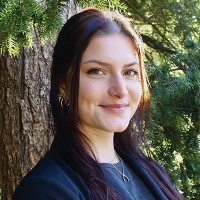
Teagan Langseth-DePaolis ’21
Northeastern University School of Law ’25
Contact: langseth-DePaolis.t@northeastern.edu
What was it like working with Oxy’s Pre-Law Advisor?
If I could attribute my success in law school and the application process to one person, it would be Professor Marisol León. Professor León saw me through the entire admissions process for law school, from when I had my first inkling of wanting to apply all the way through until I committed to Northeastern University School of Law. Professor León gave me honest and constructive feedback on all of my assignments in her courses, always giving clear and concise feedback on assignments that mirrored legal memos and briefs that we would be responsible for in law school. In addition, Professor León was open to discussing her law school admissions process with me, as well as what she would do in my shoes. Her input on my admissions decisions was extremely helpful, and ultimately led me to the program that is best-suited for my interests and needs. I will always appreciate Professor León's guidance throughout this process and her continued friendship and mentorship.
How has Occidental helped you through your law journey?
The huge selection of courses at Occidental undoubtedly helped me prepare for my law journey. In particular, taking classes in the Politics, Critical Theory and Social Justice, Urban and Environmental Policy, Religious Studies, and English departments helped me develop an intersectional and interdisciplinary view of the legal profession and what it means to study law. Throughout my journey in law school thus far, I have been able to pull from critical theory articles to bolster my legal arguments, integrate bits of knowledge acquired from class projects, and hone in my research skills gained at Oxy on legal topics of interest to me.
The close-knit community at Oxy enabled me to build close relationships with professors that I doubt I could have found elsewhere. These relationships eventually turned into research opportunities which got me engaged with my areas of interest on a whole different level. The research and writing skills I acquired while at Oxy both in-and-out of the classroom prepared me for both the volume of work and the intellectual demand of law school.
What advice would you give to pre-law students?
I would recommend that every pre-law student get involved in a student organization at Oxy or a community organization in the greater LA area. While Oxy prepares us phenomenally for law school in the classroom, getting hands-on experience with the issues that you are passionate about will teach you even more about what you can do to help. I would also advise any pre-law students to branch out in their courses by dipping into other departments that may not seem legally-oriented. Even though these classes might not seem like they help you on your pre-law track, you will be so thankful for the perspective gained in other departments when you get to law school and begin conversing with your peers and legal faculty!

